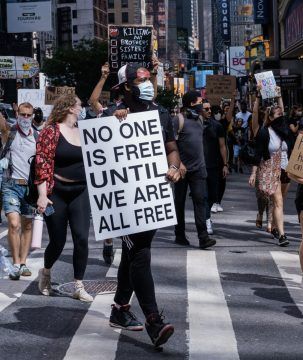Jamelle Bouie in the New York Times:
 Since it emerged seven years ago in response to the acquittal of George Zimmerman in the shooting of Trayvon Martin, the Black Lives Matter movement has produced a sea change in attitudes, politics and policy.
Since it emerged seven years ago in response to the acquittal of George Zimmerman in the shooting of Trayvon Martin, the Black Lives Matter movement has produced a sea change in attitudes, politics and policy.
In 2016, 43 percent of Americans supported Black Lives Matter and its claims about the criminal justice system; now, it’s up to 67 percent, with 60 percent support among white Americans, compared with 40 percent four years ago. Whereas Democratic politicians once stumbled over the issue, now even Republicans are falling over themselves to say that “black lives matter.” And where the policy conversation was formerly focused on body cameras and chokehold bans, now mainstream outlets are debating and taking seriously calls to demilitarize and defund police departments or to abolish them outright.
But the Black Lives Matter platform isn’t just about criminal justice. From the start, activists have articulated a broad, inclusive vision for the entire country. This, in fact, has been true of each of the nation’s major movements for racial equality. Among black Americans and their Radical Republican allies, Reconstruction — which was still ongoing as of 150 years ago — was as much a fight to fundamentally reorder Southern economic life as it was a struggle for political inclusion. The struggle against Jim Crow, likewise, was also a struggle for economic equality and the transformation of society.
More here.
